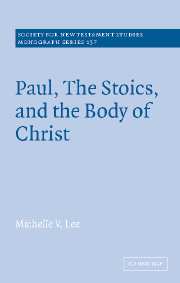Book contents
- Frontmatter
- Contents
- Acknowledgments
- List of abbreviations
- 1 Introduction
- Part I Background: the Stoics, body, and ethics
- Part II 1 Corinthians and the body of Christ
- 5 The community as Christ's body in 1 Corinthians 12
- 6 The role of the νοῦς Χριστοῦ (1 Cor. 1–4)
- 7 The application of the body of Christ: love and prophecy (1 Cor. 13–14)
- 8 Summary and conclusion
- Bibliography
- Index of passages cited
- Index of modern Authors
- Index of subjects
6 - The role of the νοῦς Χριστοῦ (1 Cor. 1–4)
Published online by Cambridge University Press: 23 November 2009
- Frontmatter
- Contents
- Acknowledgments
- List of abbreviations
- 1 Introduction
- Part I Background: the Stoics, body, and ethics
- Part II 1 Corinthians and the body of Christ
- 5 The community as Christ's body in 1 Corinthians 12
- 6 The role of the νοῦς Χριστοῦ (1 Cor. 1–4)
- 7 The application of the body of Christ: love and prophecy (1 Cor. 13–14)
- 8 Summary and conclusion
- Bibliography
- Index of passages cited
- Index of modern Authors
- Index of subjects
Summary
We have seen thus far that just as the Stoics saw humanity as a body unified by πνεῦμα, so too does Paul in 1 Cor. 12 describe the new humanity in Christ as a body in the Spirit. Overall, the chapter provides a description of the unity and diversity of the Corinthians as the body of Christ, and this description provides the basis from which Paul can give more specific instructions.
In the following chapters I will explore how Paul further develops the implications of bodily unity. First, while the inherent unity of being a body was a common trait of all humanity for the Stoics, there was still the potential for deeper relationships. “Love” was the means of forming these more intense relationships. In 1 Cor. 13 Paul similarly describes a “more excellent way” of love. Second, the Stoics' bodily unity was the foundational principle for ethical precepts. In 1 Cor. 14 Paul presents his specific commands to the Corinthians in regard to prophecy and speaking in tongues. In the whole picture of 1 Cor. 12–14, then, Paul sets the foundation of the Corinthians' corporate identity as a body, shows them the higher way of love which can intensify the already-existing unity they have in Christ, and concludes by commanding them to apply this unity and love in their use of the spiritual gifts of prophecy and tongues for the edification of the community rather than the self.
- Type
- Chapter
- Information
- Paul, the Stoics, and the Body of Christ , pp. 153 - 166Publisher: Cambridge University PressPrint publication year: 2006



